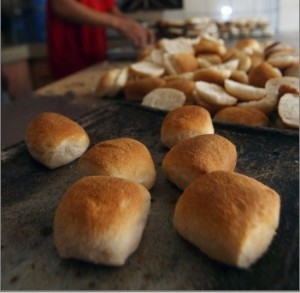Millers’, bakers’ fight may cause rise in bread prices

Prices of bread may rise by as much as 15 percent if the tariff on imported Turkish flour is increased to 20 percent from the current 7 percent, bakery owners have warned. INQUIRER FILE PHOTO
MANILA, Philippines—The Philippine Association of Flour Millers (Pafmil) renewed its push for a tariff increase on imported Turkish flour to 20 percent from 7 percent even as bakers warned that this would push up bread prices by as much as 15 percent.
This impending price hike is equivalent to a P1 increase in the price of bread and around 50 centavos for the Pinoy Pandesal bringing it to P3.50 per piece. Produced by small neighborhood bakers, Pinoy Pandesal is the brand name of affordable bread products that use the cheaper Turkish flour.
“When a country exports products at dumping (or lower than its domestic) prices, it is engaged in unfair trade,” said Pafmil executive director Ric M. Pinca.
The country, he said, is therefore up against a group of flour exporters engaging in unfair trade.
Pinca was alluding to the Filipino-Chinese Bakery Association Inc. (FCBA), which warned over the weekend that prices of bread products, biscuits and noodles will rise by 10 to 15 percent “once the government gives in to the demand of an influential lobby group to restrict the entry of affordable flour from Turkey.”
The FCBA was, in turn, alluding to Pafmil, which represents the country’s seven oldest but relatively smaller flour mills.
Last May, Pafmil filed in the Department of Agriculture a petition for antidumping proceedings against Turkish flour millers exporting flour to the Philippines “at dumping prices which is in violation of World Trade Organization rules.”
According to Pafmil, Turkey exported flour at $340 per metric ton against the domestic price of $470 in 2012. Similarly, in the previous two years, Turkish exports and local prices were at $388 against $600 and $276 against $600 in the Philippines.
Pafmil said Philippine importation of Turkish flour grew by 16 percent in 2011 and by 71 percent in 2012.
At the mercy of Turkey
“In contrast, the local flour industry grew by only one to 2 percent during the same periods,” Pinca said. “If this trend continues, there will no longer be a flour milling industry in the Philippines in just a few years and should this happen, the entire country will be left at the mercy of Turkey for our flour supply.”
He clarified that while Pafmil was against Turkish imports, the group welcomed flour shipments from Indonesia, Vietnam, Australia and India—all of which “are not dumping their flour, meaning their prices are based on verifiable market rates.”
“Last year, the Indonesian Flour Millers Association filed a complaint against Turkish flour and sometime in October, the Indonesian government imposed a 20-percent duty on (such imports),” Pinca said.
Ernesto Chua, chair of the Filipino-Chinese Business Council, said in a phone interview the impending price hike would depend on the decision of the Department of Agriculture on whether or not to increase the tariff slapped on imported Turkish flour to 20 percent from the current 7 percent.
The decision is expected to be released by middle of September, he said.
“We have already stopped importing Turkish flour because we don’t know what will happen. If the tariff on Turkish flour is increased, our products will no longer be competitive. So we are on a wait-and-see stance,” said Chua, who is also the president of flour importer Malabon Longlife Trading Corp.
Preferred by producers
Currently, Turkish flour costs about 30 percent (P200) cheaper than locally milled flour and is preferred by bread and noodle makers, according to a statement issued by the FCBA.
The group of bakery owners or producers of bread, noodles, cakes, pastries, pizza, siopao, pandesal, cookies and biscuits disclosed that hard flour or bread flour from Turkey was sold at P700 per 25-kilogram bag, while soft flour costs P620 per bag. In contrast, the price of locally milled flour is anywhere from P900 to P950 a bag.
Since flour represented more than 50 percent of the cost of bread production, an increase in the price of flour would automatically translate into higher bread prices.
“There are 25,000 bakeries operating in the Philippines and many small and medium-sized bakeries are using lower-priced flour for them to offer bread within the reach of the Filipino consumers,” FCBA said.
The petition to slap higher tariffs on imported Turkish flour came from Pafmil which, the FCBA claimed, “has the monopoly of the local flour market [and] is using its influence on the government to push the Turkish flour out of the country, so that they can dictate the prices of flour.”
Chua pointed out, however, that Turkish flour represented only 9 percent of total supply in the country, while the bulk of the volumes (89 percent) was still being supplied by Pafmil member companies, which include Liberty Flour Mills, San Miguel Purefoods and RFM Corp.














